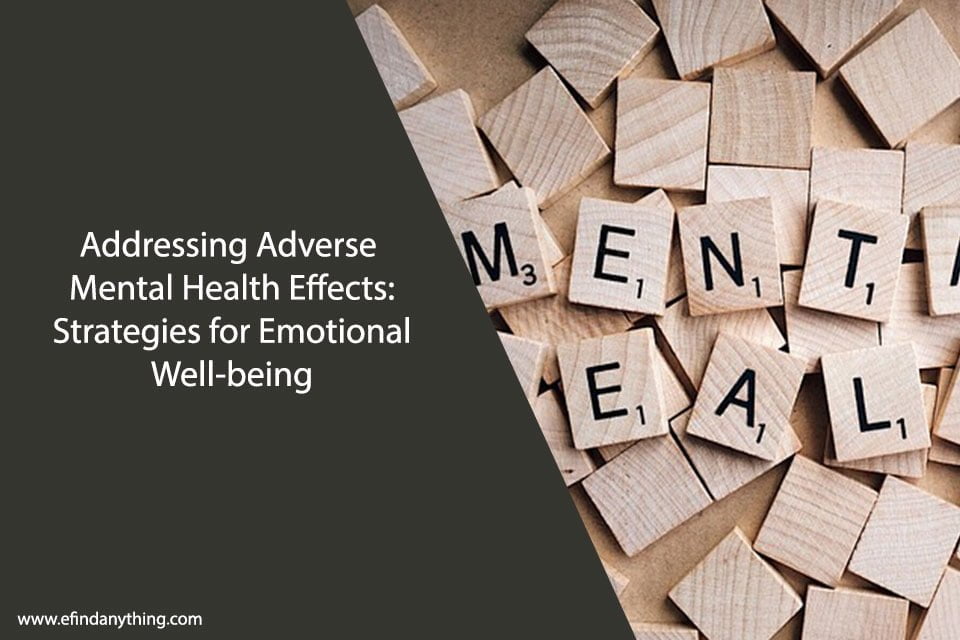
In today’s fast-paced and demanding world, it’s common to experience adverse mental health effects such as stress, anxiety, and depression. Taking proactive steps to address these challenges and promote emotional well-being is crucial for maintaining a healthy and fulfilling life. In this blog post, we will explore effective strategies for addressing adverse mental health effects and fostering a sense of balance and well-being in everyday life.
Table of Contents
Prioritize Self-Care
Self-care is the foundation of maintaining good mental health. Make it a priority to engage in activities that nurture your physical, emotional, and mental well-being. This may include practicing mindfulness and meditation, getting regular exercise, eating a balanced diet, getting enough sleep, and engaging in hobbies or activities that bring you joy. Prioritizing self-care allows you to recharge and build resilience in the face of adversity.
Seek Professional Help
If adverse mental health effects persist or become overwhelming, seeking professional help from a qualified therapist or counselor is essential. These professionals can provide guidance, support, and evidence-based strategies tailored to your specific needs. Don’t hesitate to reach out for help when you need it. Remember, seeking professional help is a sign of strength and a proactive step towards improving your mental well-being.
Beating Pornography Addiction
Addressing and beating a pornography addiction is a significant step towards mental and emotional well-being. It’s important to recognize this as a genuine struggle and not a subject of shame or guilt. Begin by acknowledging the issue and understanding the detrimental effects it can have on your mental health, relationships, and overall quality of life. Seeking professional help can be highly beneficial.
Therapists and counselors who specialize in addiction recovery can provide the necessary guidance, techniques, and support systems to help you break free from this cycle. Furthermore, joining recovery groups can also be extremely beneficial as it provides a platform for sharing experiences and gaining support from individuals who are facing similar challenges. Remember, recovery is a journey that requires patience, perseverance, and self-compassion.
Build a Supportive Network
Building a supportive network of friends, family, and loved ones is crucial for addressing adverse mental health effects. Surround yourself with people who uplift and support you. Share your feelings and concerns with trusted individuals who can listen without judgment. Participate in social activities, join support groups, or consider online communities where you can connect with others who may be experiencing similar challenges. Building a supportive network provides a sense of belonging and helps alleviate feelings of isolation.
Practice Stress Management Techniques
Stress is a common trigger for adverse mental health effects. Incorporating stress management techniques into your daily routine can help you cope and reduce its impact on your well-being. Explore techniques such as deep breathing exercises, progressive muscle relaxation, journaling, or engaging in creative outlets. Find what works best for you and make it a regular practice. By managing stress, you can improve both your mental and physical health.
Set Boundaries
Establishing healthy boundaries is essential for protecting your mental health. Learn to say no when necessary and prioritize your well-being. If certain activities, commitments, or relationships are causing excessive stress or negatively impacting your mental health, consider reevaluating them and making adjustments as needed. Setting boundaries allows you to create a healthier balance in your life and protect your emotional well-being.
Develop Coping Strategies
Developing healthy coping strategies is vital for addressing adverse mental health effects. Experiment with different strategies and find what resonates with you personally. This may include engaging in relaxation techniques, practicing gratitude, engaging in hobbies or creative outlets, seeking professional help, or talking to a trusted friend. Developing effective coping strategies allows you to navigate challenges with resilience and improve your overall well-being.
Practice Mindfulness
Mindfulness involves being fully present in the current moment and cultivating a non-judgmental awareness of your thoughts, feelings, and sensations. Engaging in mindfulness practices, such as meditation or mindful breathing exercises, can help reduce stress, increase self-awareness, and improve overall mental well-being. Make it a habit to incorporate moments of mindfulness throughout your day to promote emotional balance and clarity.
Foster Healthy Habits
Addressing adverse mental health effects involves fostering healthy habits that support your overall well-being. This includes maintaining a balanced and nutritious diet, getting regular exercise, and avoiding excessive alcohol or substance use. Engaging in healthy habits not only benefits your physical health but also has a positive impact on your mental well-being.
Addressing adverse mental health effects requires proactive steps and a commitment to self-care. By prioritizing self-care, seeking professional help when needed, building a supportive network, practicing stress management techniques, setting boundaries, developing coping strategies, practicing mindfulness, taking breaks and rest, and fostering healthy habits, you can address the challenges that arise and promote emotional well-being in your everyday life. Remember, your mental health is just as important as your physical health, and taking care of it is a lifelong journey.





